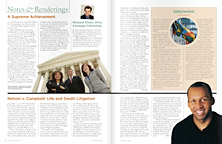Caliphs and the Constitution
Printer Friendly VersionEver since his appointment as a constitutional law consultant to the Iraq Coalition Provisional Authority last year, New York University School of Law Professor, Noah Feldman, 34, has been much in demand. Profiled in the New York Times, the Jerusalem Report, and the Village Voice, interviewed by the BBC, and often on Charlie Rose for latenight tete-a-tetes, Feldman finds himself at the center of a perfect media storm.
As an American Jew who has not only mastered constitutional law, but the tenets of Islam as well, Feldman offers a unique perspective on how to design the Iraqi constitution. He has also gained the trust of those who must implement the new system. Even when he was no longer on the government payroll, members of the former Iraqi governing council continued to seek his advice.
Feldman’s first book, After Jihad: America and the Struggle for Islamic Democracy, which was published as the troops closed in on Baghdad, contests the view that Islam is incompatible with the vote. He points out that, historically, there is nothing inherently democratic about Christianity or Judaism for that matter. “From the beginning of Muslim history, the caliphs were understood to be selected by people, not God,” says Feldman. “They were expected to consult with the community.”
Yet Feldman knows change won’t be easy or swift. He sensibly predicted that it would be impossible to hold elections in Iraq as quickly as originally planned, and was in the ranks of those who criticized the U.S. for lax security during the first weeks of the occupation. As he has frequently been heard to say, “I would rather we do this right than do it fast.”

